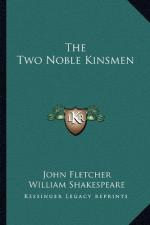|
This section contains 8,759 words (approx. 30 pages at 300 words per page) |

|
SOURCE: "The Two Noble Kinsmen as Bourgeois Drama," in Shakespeare, Fletcher and The Two Noble Kinsmen, edited by Charles H. Frey, University of Missouri Press, 1989, pp. 145-62.
In the following essay, Abrams argues that The Two Noble Kinsmen reflects the values of the bourgeois class in that the kinsmen, despite their apparent aspirations to antiquarian noble ideals, treat love in a mercantile, commericalized manner.
The work of an age of chivalric nostalgia and mercantile ambition, The Two Noble Kinsmen constantly grinds the one against the other. Presenting himself to Theseus, Arcite avows that he hopes "To purchase name, and do my ablest service / To such a well-found wonder as thy worth" (2.5.26-27). Noble titles are not literally for sale in Theseus's court, as they were in James's England.1 But Arcite's metaphor captures the spirit of a world in which name must now be "bought," can no longer be...
|
This section contains 8,759 words (approx. 30 pages at 300 words per page) |

|


